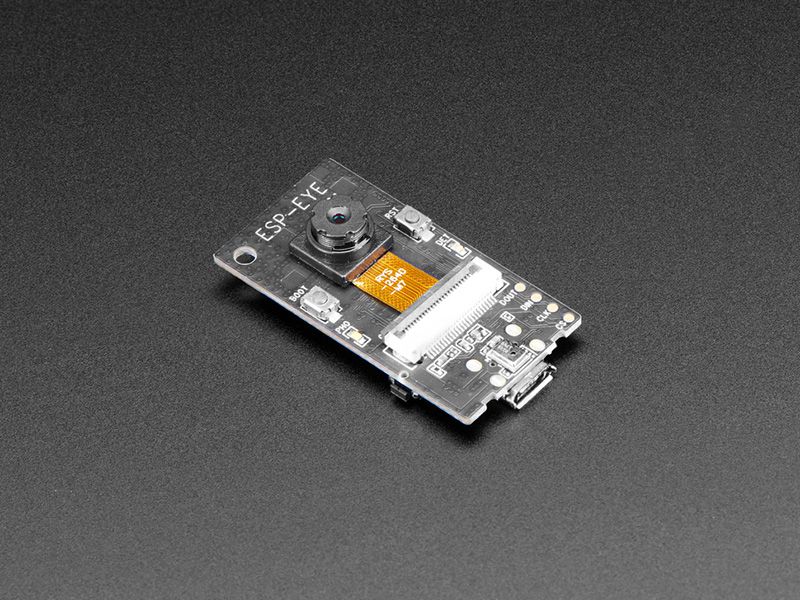
ESP-EYE by Espressif
Ever wanted to dabble in face and/or speech recognition? Espressif’s ESP-EYE is a miniature ESP32-based development board that combines a digital microphone, ESP32 (of course) with 8 MB PSRAM and 4 MB flash, and a 2 megapixel camera. There’s a few buttons and LEDs as well for basic control and configuration.
Unlike some boards, this codebase does not require internet connectivity - you don’t have to send video or audio data to ‘the cloud’ - it’s all processed on-chip! The built in demo shows off what it can do:
- Plug into a computer USB port and open up a serial port connection at 115,200 baud to the new serial port
- Once the red LED is lit, activate the board with the watchword “Hi Lehshin” (in documents they spell it lexin, the x is pronounced as a shh sound)
- The red LED will blink - then connect to the new Wi-Fi access point created
- Open up a web browser to http://192.168.4.1/face_stream
- Point the camera at faces to show off the recognition boxes! Video is about 2 frames per second, not super fast.
Purchase
Contribute
Have some info to add for this board? Edit the source for this page here.
CircuitPython 9.2.8
This is the latest stable release of CircuitPython that will work with the ESP-EYE. Use this release if you are new to CircuitPython.
Modules included in this download
_asyncio adafruit_bus_device aesio alarm analogbufio analogio array atexit audiobusio audiocore audioio audiomixer audiomp3 binascii bitbangio bitmaptools board builtins builtins.pow3 busdisplay busio busio.SPI busio.UART codeop collections countio digitalio displayio dualbank epaperdisplay errno espcamera espidf espnow espulp fontio fourwire framebufferio frequencyio getpass gifio hashlib i2cdisplaybus io ipaddress jpegio json locale math max3421e mdns memorymap microcontroller msgpack nvm onewireio os os.getenv paralleldisplaybus pulseio pwmio qrio rainbowio random re rtc sdcardio select sharpdisplay socketpool socketpool.socketpool.AF_INET6 ssl storage struct supervisor synthio sys terminalio tilepalettemapper time traceback ulab usb vectorio warnings watchdog wifi zlibFeatures: Wi-Fi, Camera, Bluetooth/BTLE
CircuitPython 10.0.0-alpha.8
This is the latest development release of CircuitPython that will work with the ESP-EYE.
Alpha development releases are early releases. They are unfinished, are likely to have bugs, and the features they provide may change. Beta releases may have some bugs and unfinished features, but should be suitable for many uses. A Release Candidate (rc) release is considered done and will become the next stable release, assuming no further issues are found.
Please try alpha, beta, and rc releases if you are able. Your testing is invaluable: it helps us uncover and find issues quickly.
Release Notes for 10.0.0-alpha.8
Modules included in this download
_asyncio _bleio _bleio (native) _eve _pixelmap adafruit_bus_device adafruit_pixelbuf aesio alarm analogbufio analogio array atexit audiobusio audiocore audiomixer audiomp3 binascii bitbangio bitmapfilter bitmaptools board builtins builtins.pow3 busdisplay busio busio.SPI busio.UART codeop collections countio digitalio displayio epaperdisplay errno espcamera espidf espnow espulp fontio fourwire framebufferio frequencyio getpass gifio hashlib i2cdisplaybus io ipaddress jpegio json keypad keypad.KeyMatrix keypad.Keys keypad.ShiftRegisterKeys keypad_demux keypad_demux.DemuxKeyMatrix locale lvfontio math max3421e mdns memorymap microcontroller msgpack nvm onewireio os os.getenv paralleldisplaybus ps2io pulseio pwmio qrio rainbowio random re rotaryio rtc sdcardio select sharpdisplay socketpool socketpool.socketpool.AF_INET6 ssl storage struct supervisor synthio sys terminalio tilepalettemapper time touchio traceback ulab usb vectorio warnings watchdog wifi zlibFeatures: Wi-Fi, Camera, Bluetooth/BTLE
Absolute Newest
Every time we commit new code to CircuitPython we automatically build binaries for each board and language. The binaries are stored on Amazon S3, organized by board, and then by language. These releases are even newer than the development release listed above. Try them if you want the absolute latest and are feeling daring or want to see if a problem has been fixed.
Previous Versions of CircuitPython
All previous releases of CircuitPython are available for download from Amazon S3 through the button below. For very old releases, look in the OLD/ folder for each board. Release notes for each release are available at GitHub button below.
Older releases are useful for testing if you something appears to be broken in a newer release but used to work, or if you have older code that depends on features only available in an older release. Otherwise we recommend using the latest stable release.
